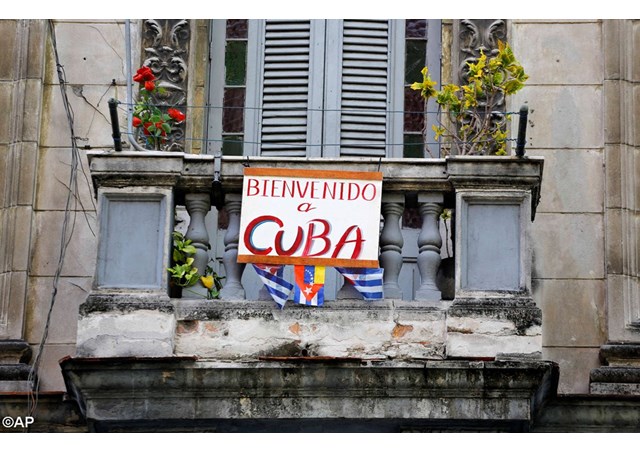
U.S.-Cuban connections at heart of Pope Francis pastoral visit

(Vatican Radio) Pope Francis travels to Havana, on Saturday at the start of his ten day visit to Cuba, the United States and the United Nations in New York. The first part of that pastoral journey will take him to the Cuban capital and then on to the cities of Holguin and Santiago de Cuba on the south-eastern tip of the island, where he’ll rededicate the Caribbean country to Our Lady of Charity of ‘El Cobre’.
Pope Francis follows in the footsteps of his predecessor, Pope Benedict XVI, who visited Cuba in 2012 and of Pope John Paul II, who was the first pontiff to travel to the communist country in 1998. But Francis will be the first Latin American pope to visit the island, just two months after the announcement of the restoration of diplomatic relations between Cuba and the United States - a historic development with which the Vatican was closely involved.
Oblate Father Andrew Small is director the Pontifical Mission Societies in the United States, but back in the early 2000s he travelled regularly to Cuba as secretary of the U.S. Bishops’ office for Latin America. Ahead of the Pope’s departure, he talked to Philippa Hitchen about the importance of U.S.-Cuban relations and about the welcome Pope Francis will receive from the Cuban people…
Listen:
Fr Andrew say the Cuban Church has always been strongly supported by the Church in the United States and that the U.S. bishops have constantly worked for the lifting of the economic embargo that has had such serious repercussions on the lives of ordinary Cubans.
Since the “shifting sands following the fall of the Berlin wall in 1989 and Cuba’s realignment, less with the Soviet bloc and more with certain forces in Latin America”, Fr Andrew says the economic isolation of the country has continued. But he traces the “reforms and opening up to ownership of small businesses” that have taken place since the previous papal visits…..
Fr Andrew notes that the relationship between the U.S. and Cuba has always been very tense and “complicated by forces on the ground” such as the “old guard” in Havana and the exile community in Miami and the Eastern United States.
Following the handover of power from Fidel Castro to his brother Raul, Fr Andrew says the new Cuban leader found it “difficult to free himself from the more hardline forces” that were keeping the “memory and principles of the revolution” alive. But the Cuban Church, he continues, has always been “a key partner in helping some of those openings happen without losing face or seeming as if the revolution was crumbling”….
Fr Andrew says that Pope Francis has many advantages as the first Latin American Pope in that he understands the political context of the region and knows many of the players personally. He is “able to come into that and try to seek some new beginning – which is what the party seemed to want but never knew how to get there”, he says.
| All the contents on this site are copyrighted ©. |


